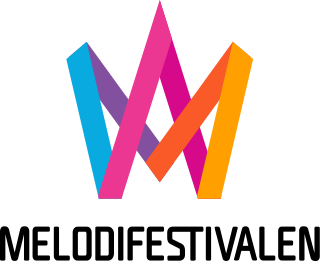
Melodifestivalen is an annual song competition organised by Swedish public broadcasters Sveriges Television (SVT) and Sveriges Radio (SR). It determines the country's representative for the Eurovision Song Contest, and has been staged almost every year since 1959. In the early 2000s, the competition was the most popular television programm in Sweden; it is also broadcast on radio and the Internet. In 2012, the heats averaged 3.3 million viewers, and over an estimated four million people in Sweden watched the final, almost half of the Swedish population.
Sweden was present at the Eurovision Song Contest 1999, held in Jerusalem.
Sweden was in their second Eurovision Song Contest represented by Brita Borg with the song "Augustin". The winning song was elected in the Swedish national final: Melodifestivalen 1959. Eight semi-finals were held on the radio. During the semi-finals, Sveriges Radio decided that the winning song would represent Sweden at the Eurovision Song Contest 1959. The singer for Cannes had already been selected.
Sweden chose its entry for Eurovision Song Contest 1960 by the national final, Melodifestivalen 1960. The winning song, "Alla andra får varann" was performed once by Östen Warnerbring and once by Ingrid Berggren. However Sveriges Radio decided that Siw Malmkvist would represent Sweden, as she had been denied that the previous year.
Sweden chose their entrant for the Eurovision Song Contest 1961 through Melodifestivalen 1961. The song "April, april", performed once with Siw Malmkvist, once with Gunnar Wiklund, won. However, none of them was considered acceptable for singing in ESC, so Lill-Babs was chosen as representative instead. In the contest, once more held in Cannes, she finished in 14th place.
Sweden was represented by Inger Berggren, singing "Sol och vår", in the Eurovision Song Contest 1962. Berggren was selected by a national final called Eurovisionsschlagern, svensk final. Another singer, Lily Berglund, also sung the song there. The song was written and composed by Ulf Källkvist and Åke Gerhard.
In the Eurovision Song Contest 1963, Sweden was represented by Monica Zetterlund, a popular jazz singer. Her song, written by Bobbie Ericsson and Beppe Wolgers, was called "En gång i Stockholm". Carli Thornehave also sung the winning song at the national final.
Sweden competed in Eurovision Song Contest 1966 with the song "Nygammal vals" performed by Lill Lindfors and Svante Thuresson. It was written by Bengt-Arne Wallin and Björn Lindroth. Much thanks to Scandinavian neighbours, Sweden took their best placement so far in ESC this year, held in Luxembourg, with 16 points and a 2nd place.
The Swedish entry for the Eurovision Song Contest 1967 was Östen Warnerbring and the song "Som en dröm", composed by Curt Pettersson and Marcus Österdahl and written by Patrice Hellberg. The national selection was for the first time called "Melodifestivalen", a name that remains to this day.
In the Eurovision Song Contest 1968, Sweden was represented by Claes-Göran Hederström with the song "Det börjar verka kärlek, banne mig", written and composed by Peter Himmelstrand. It finished 5th with 15 points, including 6 from Norway, the highest number of votes awarded that year.
Sweden chose their entrant for Eurovision Song Contest 1969 through Melodifestivalen 1969. A tie occurred between two songs, but after additional voting, the song "Judy, min vän" with Tommy Körberg was selected. It was written by Roger Wallis and Britt Lindeborg. The other song, "Hej clown" was written by Lasse Berghagen and later ABBA member Benny Andersson.
Thanks to ABBA's victory the preceding year, Sweden hosted the Eurovision Song Contest 1975. Their entry was chosen in Melodifestivalen 1975, and the winner was last year's runner up, Lasse Berghagen, with the song "Jennie, Jennie", which he had written and composed himself.
Sweden selected their entry for ESC 1977 in the show "Melodifestivalen 1977". The winner was the song "Beatles" by a group called Forbes. It was a tribute to the rock band The Beatles, who had split up some years earlier, and was written by Sven-Olof Bagge and Claes Bure.
For the Eurovision Song Contest 1978, Sweden held a national final called Melodifestivalen 1978. The winner and representative was "Det blir alltid värre framåt natten", sung by Björn Skifs, and written and composed by Peter Himmelstrand.
Sweden selected their representative for the Eurovision Song Contest 1979 in a show called Melodifestivalen 1979. The winner was the popular pop singer Ted Gärdestad with the song "Satellit", which he composed, while the lyrics were by his brother, Kenneth Gärdestad.
Sweden chose their entry for the Eurovision Song Contest 1981 in the national selection Melodifestivalen 1981. After a tight race, the winner was a song called "Fångad i en dröm", which was performed by Björn Skifs. Björn was also the Swedish representative in the 1978 contest, and had written the song together with Bengt Palmers.
Sweden entered the Eurovision Song Contest 1990, held in Zagreb, Yugoslavia.
After Carola Häggkvist's win in the 1991 contest, Sweden was the host of the Eurovision Song Contest 1992, held in Malmö. Sveriges Television, the Swedish broadcaster, continued to use the Melodifestivalen format to select their entry.
Sweden entered the Eurovision Song Contest, held in Dublin, Ireland. Sveriges Television continued to use the Melodifestivalen contest to select the Swedish entry.
Sweden participated in the Eurovision Song Contest 2016 with the song "If I Were Sorry" written by Oscar Fogelström, Michael Saxell, Fredrik Andersson and Frans Jeppsson Wall. The song was performed by Frans. In addition to participating in the contest, the Swedish broadcaster Sveriges Television (SVT) also hosted the Eurovision Song Contest after winning the competition in 2015 with the song "Heroes" performed by Måns Zelmerlöw. SVT organised the national final Melodifestivalen 2016 in order to select the Swedish entry for the 2016 contest in Stockholm. After a six-week-long competition consisting of four heats, a Second Chance round and a final, "If I Were Sorry" performed by Frans emerged as the winner after achieving the highest score following the combination of votes from eleven international jury groups and a public vote.
